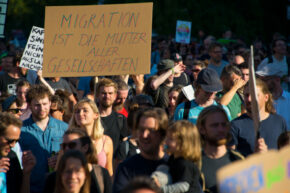
Marie Moncada
Postdoctoral Fellow
Sciences Po’s Centre for European Studies and Comparative Politics (CEE)
This Working Paper examines the way in which narratives on migration circulate in France across communicative and coordinative spheres. It focuses on three events: the relocation of migrants in 2015, the temporary protection triggered for the war in Ukraine in 2022 and the allocation of a port for the Aquarius in 2018. It explores whether narratives are embraced, adapted, ignored, or rejected between the media, Parliament, and administrations.
The first result shows that these narratives are generally positive towards migrants because they are detached from two sensitive issues in France: the integration of immigrants and the violence they might commit.
A second finding is that, overall, within the communicative sphere, parliamentarians tend to reproduce the media narrative, whereas the media tend to favour the narrative of French and European governments. As well, for the relocation and the temporary protection, the coordinative sphere (consisting of administrative circulars) has a slightly different narrative because, unlike the media and Parliament, it enforces policy solutions and does not propose any. But, for the Aquarius event, the coordinative sphere (corresponding to a presidential speech) embraces the narratives of parliamentarians and the media to counter the arguments attacking the French government.
A third result proposes to distinguish between ‘lay’ and ‘technocratic’ narratives based on their content and the way in which they use the notion of ‘the people’.
The fourth result establishes a link between the use of ‘lay’ or ‘technocratic’ narratives by the government depending on the context in which it is situated.







